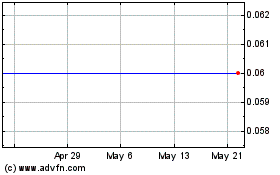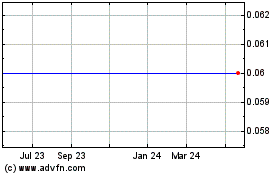Gespeg Starts Exploration Program at Lac Arsenault Gold Project
10 September 2020 - 10:30PM

GESPEG RESOURCES LTD. (TSX-V:GCR) (the
“
Company” or
“Gespeg”), following
a successful financing and completing data compilation, Gespeg is
pleased to announce the start of exploration work program (the
“Program”) on its 100% owned Lac Arsenault gold project in the
heart of the Gaspé Peninsula of Quebec. Lac Arsenault project has
been enlarged and is now composed of 39 claims covering 2,261 ha
and situated south of the Grand Pabos fault.
The Program includes a low-altitude
high-resolution, helicopter-borne magnetic survey, soil sediment
survey, trenching and detailed mapping of old and recent
trenches.
The Lac Arsenault property consists of a series
of gold-bearing and polymetallic veins (Au-As-Pb-Zn-Cu- (Ag)),
oriented NNE, subvertical up to nearly a hundred meters in length
and decimetric to metric thickness. The most important veins are
the Baker vein, the Mersereau vein, the L4W vein and the Marleau
vein (see table 1, 2) and (figure 1 : Map of claims of Lac
Arsenault): https://www.globenewswire.com/NewsRoom/AttachmentNg/893b626d-71df-4ac1-9b58-3714fdc654cd
Table 1: Main gold veins of the Lac
Arsenault property in channel sampling
|
Vein |
Exposedlength (m) |
Variablewidth (m) |
Direction (°) |
Average gradeAu (g/t) |
Average gradeAg (g/t) |
|
Baker |
45 |
0.1 to 1.2 |
10 to 40 |
13.54 |
453.94 |
|
Mersereau |
75 |
0.2 to 1.6 |
30 to 40 |
10.35 |
113.03 |
|
Marleau |
76 |
0.1 to 1.1 |
5 to 15 |
5.59 |
- |
|
L4W |
84 |
0.1 to 3.0 |
30 |
1.47 |
- |
|
Greek |
11 |
0.5 to 3.0 |
110 to 135 |
0.65 |
- |
|
Source: Unpublished report presented by Ressources Appalaches
2005. |
|
All data included in the above has been verified by Bernard-Olivier
Martel, P. Geo, the Company's Director of Exploration, through
researching and compiling all the reports available for historical
data. The company has not re-assayed samples or drill hole
intervals. (see press release Sept. 13, 2018) |
Table 2: Main gold veins of the Lac
Arsenault property in drilling
|
Veine |
Drill Hole |
From(m) |
To(m) |
Length ***(m) |
Au (g/t) |
Ag (g/t) |
Source |
|
Baker |
AM1 |
114.9 |
115.4 |
0.5 |
8.75 |
91.88 |
GM 32162 |
|
Baker |
A-2 |
21.3 |
22.7 |
1.4 |
10 |
133.59 |
GM 32162 |
|
Baker |
A-3 |
29.6 |
32.8 |
3.2 |
3.63 |
12.28 |
GM 32162 |
|
Baker |
A-6 |
21.3 |
22 |
0.7 |
9.38 |
116.56 |
GM 32162 |
|
Baker |
A-7 |
31.5 |
36.1 |
4.6 |
3.44 |
21.88 |
GM 32162 |
|
Baker |
A-13 |
67.4 |
67.7 |
0.3 |
9.69 |
50.31 |
GM 32162 |
|
Baker |
A-12 |
14.8 |
15.5 |
0.7 |
11.88 |
46.56 |
GM 32162 |
|
Baker |
F05-01 |
31.5 |
32.2 |
0.7 |
16.85 |
96.2 |
* |
|
Baker |
F05-01 |
33.7 |
34 |
0.3 |
3.77 |
32.4 |
* |
|
Baker |
F05-01 |
34 |
34.55 |
0.55 |
15.9 |
115 |
* |
|
Baker |
F05-02 |
46.9 |
47.15 |
0.25 |
14.95 |
151 |
* |
|
Baker |
F05-03 |
56.7 |
56.9 |
0.2 |
11.95 |
51.1 |
* |
|
Baker |
F05-05 |
46.7 |
47.5 |
0.8 |
4.62 |
16 |
* |
|
Baker |
F05-07 |
44.05 |
44.3 |
0.25 |
9.47 |
358 |
* |
|
Baker |
F05-07 |
44.3 |
44.5 |
0.2 |
19.65 |
25.7 |
* |
|
Baker |
F05-07 |
44.5 |
44.7 |
0.2 |
16.15 |
65.6 |
* |
|
Baker |
F05-28 |
104 |
104.5 |
0.5 |
7.43 |
74.3 |
* |
|
Marleau |
86-24 |
89.9 |
91.5 |
1.6 |
10.72 |
8.2 |
GM 45384 |
|
Marleau |
86-24A |
140.5 |
140.8 |
0.3 |
8.5 |
22.19 |
GM 45384 |
|
Mersereau |
A-9 |
39.1 |
39.3 |
0.2 |
3.25 |
15.31 |
GM 32162 |
|
Mersereau |
A-10 |
12 |
13.2 |
1.1 |
1.69 |
22.5 |
GM 32162 |
|
Mersereau |
A-19 |
8.5 |
9.8 |
1.2 |
43.75 |
29.69 |
GM 32162 |
|
Mersereau |
86-14 |
19.9 |
20 |
0.2 |
7.31 |
34.38 |
GM 45384 |
|
Mersereau |
86-26 |
25 |
25.1 |
0.1 |
8.5 |
64.06 |
GM 45384 |
|
Mersereau |
F05-15 |
34 |
34.4 |
0.4 |
5.37 |
13.9 |
* |
|
Mersereau |
F05-17 |
47.2 |
47.6 |
0.4 |
6.74 |
45.2 |
* |
|
Mersereau |
F05-24 |
25.1 |
25.6 |
0.5 |
4.83 |
5.3 |
* |
| *: |
Unpublished report
presented by Ressources Appalaches in 2005. |
| **: |
Technical data not
available |
| ***: |
Drilled length |
| All data included
in the above has been verified by Bernard-Olivier Martel, P. Geo,
the Company's Director of Exploration, through researching and
compiling all the reports available for historical data. The
company has not re-assayed samples or drill hole intervals. |
The mineralization was interpreted as
mesothermal gold veins with mineralization contained in fault-fill
veins placed in the grauwackes and siltstones of the Arsenault
Formation, of middle Ordovician age.
The veins are associated with sinistral,
fragile-ductile, NNE-trending shear zones, which correspond to
secondary structures of the Grand Pabos fault, an important dextral
strike-slip fault in the south of the peninsula, located about 500
meters to the north of the property.
The historical work carried out on the Lac
Arsenault property leads to the following observations:
- The Baker, Mersereau, L4W and Marleau mineralized veins are
spatially associated with brittle-ductile shear zones (The
orientation of the veins is geometrically compatible with sinistral
shear zones oriented between N20 and N40, as found in along the
veins in most of the trenches),
- The mineralized veins are described as being shear veins or
fault-fill veins associated more specifically with the N40 sinister
shears, themselves satellite faults of the Grand Pabos fault.
- The vein segments oriented at an angle of 45 degrees with
respect to the sinistral shear zones NNE seem more favorable for
the deposition of metals,
- Some shear zones are clearly posterior to the veins and the
hydrothermal event,
- Extension quartz veins with comb textures oriented parallel to
the Baker vein are folded by one of the N40 sinister shear zones
suggesting that some of the N40 shears post-date the mineralized
veins.
The chronological relationships between the
veins and the shear zones are important. It is therefore essential
to undertake a structural study in order to properly characterize
the deformation of the veins, the possible displacements, the
orientation of the folds, in order to follow the mineralization in
the future. As such, the Program was designed to include the
following:
- Clean existing trenches
- Complete new trenches on areas that returned soil sample
anomalies for As and Ag, targets for lateral extensions of known
veins and targets for surface projections of veins cut from
historic boreholes
- Complete detailed structural mapping of historic and recent
trenches.
- A soil geochemical survey (horizon b) in order to define new
targets anomalous in As and Ag
- A low-altitude helicopter-borne magnetic survey aimed at
identifying and interpreting new structures similar to known
mineralized zones.
About Gespeg Resources Inc.:
Gespeg is an exploration company with a focus in strategic and
energetic metals and underexplored regions “Gaspé, Chibougamau
Québec”. With a dedicated management team, the Company’s goal is to
create shareholder value through the discovery of new deposits.
Bernard-Olivier Martel, P. Geo, the Company's
Director of Exploration, is a qualified person (as such term is
defined in National Instrument 43-101 - Standards of Disclosure for
Mineral Projects) and has reviewed and approved the technical
disclosure contained in this news release.
GESPEG RESOURCES LTD.
(signed) “Sylvain Laberge”
Sylvain Laberge President and
CEO
514.702.9841slaberge@gespegcopper.com
Some of the statements contained in this press
release are forward-looking statements and information within the
meaning of applicable securities laws. Forward-looking statements
and information can be identified by the use of words such as
“expects”, “intends”, “is expected”, “potential”, “suggests” or
variations of such words or phrases, or statements that certain
actions, events or results “may”, “could”, “should”, “would”,
“might” or “will” be taken, occur or be achieved. Forward-looking
statements and information are not historical facts and are subject
to a number of risks and uncertainties beyond the Company’s
control. Actual results and developments are likely to differ, and
may differ materially, from those expressed or implied by the
forward-looking statements contained in this news release.
Accordingly, readers should not place undue reliance on
forward-looking statements. The Company undertakes no obligation to
update publicly or otherwise revise any forward-looking statements,
except as may be required by law.
Neither TSX Venture Exchange nor its
Regulations Services Provider (as that term is defined in policies
of the TSX Venture Exchange) accepts responsibility for the
adequacy or accuracy of this release.
Gespeg Resources (TSXV:GCR)
Historical Stock Chart
From Dec 2024 to Jan 2025

Gespeg Resources (TSXV:GCR)
Historical Stock Chart
From Jan 2024 to Jan 2025
